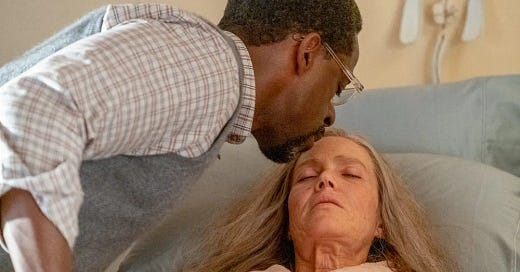Do You Ever Think About Dying?
Dr. Shoshana Ungerleider does: She has started an organization dedicated to making death in TV and film more realistic—and helping us to plan for our own eventual demise.
We need more death on TV and in movies—at least the realistic kind. TV, in particular, because of its omnipresence in our daily lives, shapes the ways we think about crucial issues, and nothing is more crucial, or universal, than the end of our lives. That’s why Dr. Shoshana Ungerleider launched Endwell, an organization dedicated to changing the way that we approach death, with a heavy emphasis on how the media portrays the end of life.
While she has particularly admired the ways that shows such as This Is Us and The Resident have faced death, she hopes to fight the general American avoidance of death and Hollywood’s obsession with youth by encouraging the industry to tell more interesting stories around the end of life—which is, after all, the ultimate in the human experience.
This is one of my pet issues. I was so excited to read that you were specifically interested in Hollywood. First of all, as a doctor, why does accurate depiction of end-of-life on television mean so much to you?
I've witnessed so much suffering for people in and around the end of people’s lives. First, in the early days of my training, taking care of patients in the ICU, I realized that people really have a mismatch of expectations about what's possible. I mean, modern medicine and the technology we use is phenomenal and we save lives every day, which I'm very proud of. But for some people, doing aggressive and invasive things to keep them alive at all costs, especially if they're older, more frail, or have end-stage organ disease or stage-four cancer, doesn't always make sense. And we're not talking about that.
When we don't accurately portray what end-of-life looks like for most people, or what aggressive invasive treatment looks like for people, you don't have a sense of it.
Unless you've worked in healthcare or witnessed what it's like to be sick in an ICU, you don't realize that all those tubes and lines are really not comfortable. It's a situation where unless you opt out of aggressive treatment, that's what you'll get if you end up at a hospital, even if you're 95 years old. And so we tend to not have those conversations with patients, and it lands far too many people living out their final moments of life hooked up to tubes and machines and surrounded by strangers and frankly suffering when that doesn't have to be the case.
So while I get that the function of television is to entertain audiences, there are ways to have nuanced and funny and thoughtful storylines that include more diverse representation of what's possible around the options at end-of-life, whether it be hospice, whether it be just the conversations that can take place between family members and clinicians, whether it be psychedelics at end of life or death doulas.
There are so many things that I think are interesting to audiences that don't have to be morbid and sad.
For a white paper, we looked at script analysis from the last ten years of how end-of-life was talked about. We've had really interesting interviews with showrunners and writers about what they think is cool and would resonate with audiences.





